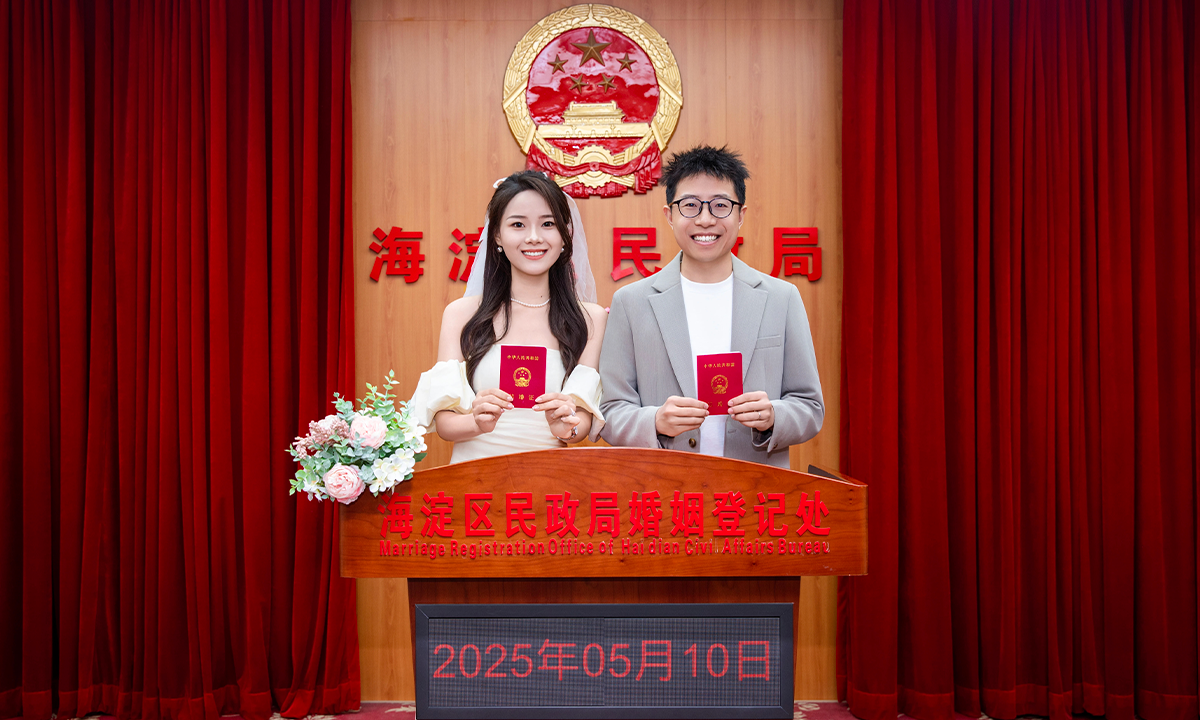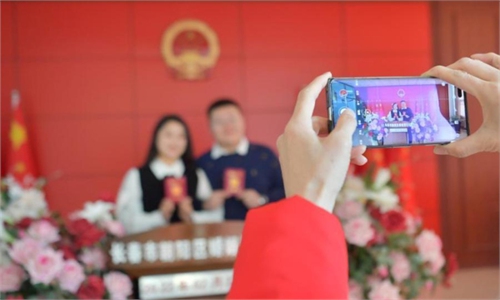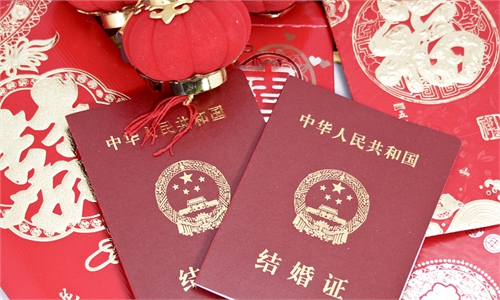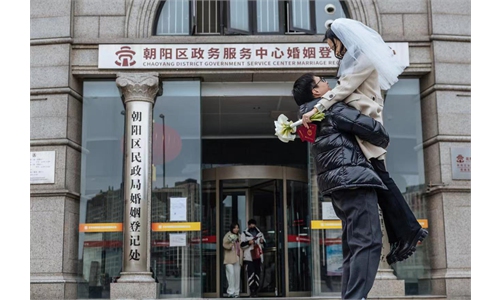China simplifies marriage registrations, prompting surge in cross-regional couples tying the knot

A couple registers their marriage at a civil affairs bureau in Haidian district, Beijing on May 10, 2025. Photo: Courtesy of Huang Qiqi
China's revised marriage registration regulations came into effect on Saturday, simplifying the procedure for marriage registration and allowing couples to register anywhere in the country regardless of their hukou household registration locations.
In Beijing alone, over 1,400 couples registered for marriage on Saturday, with cross-regional registrations, or those who don't hold a local household registration certificate, accounting for 31.9 percent of the total, China Central Television (CCTV) reported.
A registrar at a marriage registration office in Southwest China's Sichuan Province also said the number of couples registering in the city has increased compared to previous periods, Chengdu Daily reported.
Although marriage registration offices only operated in the morning on Saturday - the first day of the new policy's implementation - Shenzhen Fabu, citing data from the Shenzhen Civil Affairs Bureau, reported that 439 couples completed marriage registrations citywide.
The updated regulations eliminate the need for household registration books, which have long been necessary for marriage applications. Couples now need only present their identification cards and sign a declaration affirming they are unmarried and not close blood-relations within three generations in order to be officially registered for marriage, according to the Xinhua News Agency.
Additionally, the new rules allow couples to register their marriage at any eligible registry office nationwide, regardless of their household registration location, said Xinhua.
Huang Qiqi, from Guizhou Province in Southwest China, and Li Chenxi, from Wuhan in Central China's Hubei Province, shared their registration experience with the Global Times on Sunday. The couple has lived, studied, and worked in Beijing for eight years.
Coincidentally, their sixth anniversary fell on Sunday, the day they had scheduled their marriage registration appointment.
They were initially nervous, uncertain whether the new regulations would be fully implemented on the first day. They even made several calls to the civil affairs bureau to confirm the process.
However, upon arriving at the bureau and seeing the signs confirming that couples could register their marriage at any eligible registry office nationwide, regardless of their household registration location, they were reassured. The staff, equally excited, told them they were witnessing a historic moment, according to the couple.
Huang recalled a humorous moment: "We arrived early, being the first couple at the window. The staff initially asked for our household registration books. We froze for a few second, and then all three of us laughed! In the end, only our IDs and three red-background photos were needed, making the process very convenient!"
Following the new regulation's implementation, registrars no longer need to determine the jurisdiction for marriage registration based on household registration books, which has improved the convenience and efficiency of the process, Chengdu Daily reported. "Previously, processing used to take 12 to 15 minutes for one couple, and now it can be completed in under 10 minutes," a registrar said.
The change also applies to couples with one partner who is a Chinese mainland resident and the other a resident of Hong Kong, Macao or Taiwan, or foreign national, according to the Ministry of Civil Affairs, Xinhua reported.
These couples can now marry, divorce or apply for marriage certificate reissuance at any authorized registration office, regardless of the mainland partner's household registration location.
This regulation overhaul is part of China's broader push to streamline public services and ease the burdens of its citizens - particularly for the increasing numbers of people living and working away from the place of their household registration, per report.
To support the new marriage registration policy, the Civil Affairs Bureau of Shenzhen has instructed district civil affairs bureaus to implement a combined "online + offline" appointment system. In addition, preparations have been made by increasing appointment quotas, reallocating workforce, and adjusting working hours to better meet public demand. Couples unable to secure online appointments can bring the required documents and queue at the office for registration, the report said.
A marriage registration official in Chongqing, in Southwest China, mentioned that to support the new service, extra volunteers and social workers have been deployed and additional windows opened to ensure smooth service, according to People.cn.
Multiple departments have coordinated to offer a comprehensive, accessible, and entirely free marriage registration service. This includes free registration photos, free marriage health checks, legal consultations, and marriage and family counseling, said the report.
Meanwhile, Hangzhou saw a small surge in cross-regional marriage registrations. One county in Hangzhou relocated its registration center to a 5A-level scenic area, connecting multiple outdoor certification sites and offering newlyweds discounts on entry, meals, and accommodation at the tourist area.



